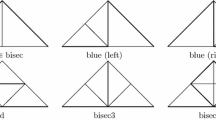Abstract
In this paper an adaptive finite element method is constructed for solving elliptic equations that has optimal computational complexity. Whenever, for some s > 0, the solution can be approximated within a tolerance ε > 0 in energy norm by a continuous piecewise linear function on some partition with O(ε-1/s) triangles, and one knows how to approximate the right-hand side in the dual norm with the same rate with piecewise constants, then the adaptive method produces approximations that converge with this rate, taking a number of operations that is of the order of the number of triangles in the output partition. The method is similar in spirit to that from [SINUM, 38 (2000), pp. 466-488] by Morin, Nochetto, and Siebert, and so in particular it does not rely on a recurrent coarsening of the partitions. Although the Poisson equation in two dimensions with piecewise linear approximation is considered, the results generalize in several respects.
Similar content being viewed by others
Author information
Authors and Affiliations
Corresponding author
Rights and permissions
About this article
Cite this article
Stevenson, R. Optimality of a Standard Adaptive Finite Element Method. Found Comput Math 7, 245–269 (2007). https://doi.org/10.1007/s10208-005-0183-0
Received:
Accepted:
Published:
Issue Date:
DOI: https://doi.org/10.1007/s10208-005-0183-0




